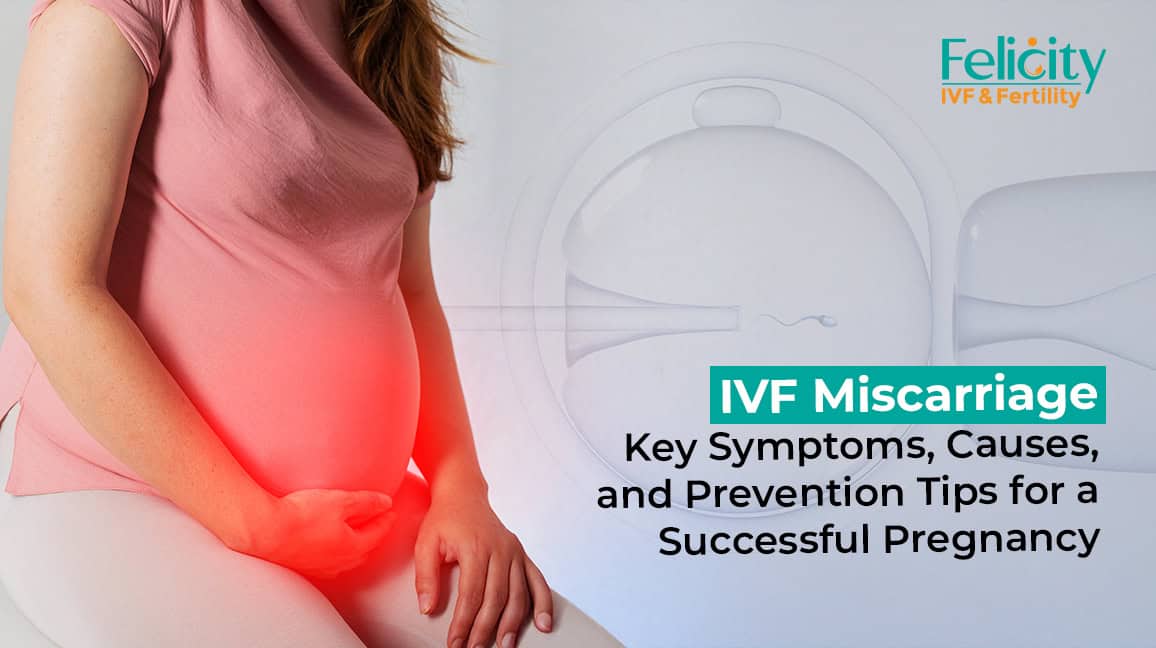IVF Miscarriage: Key Symptoms, Causes, and Prevention Tips for a Successful Pregnancy

There is usually a mixed experience of hope and doubt as couples who have sought the help of assisted means of getting children approach parenthood. IVF miscarriage is one of the most emotionally devastating setbacks to follow this route. Although in vitro fertilisation has provided fertility to many people, individuals need to realise that a woman can still lose a pregnancy despite the advanced medical procedures.
Today, we are going to dwell upon the most topical IVF miscarriage symptoms, i.e., clues, causes, and ways to prevent it, such that people, having some light shed upon this process, can become more educated, less vulnerable, and more independent in their fertility path altogether.
What is Miscarriage IVF?
An IVF miscarriage means the defeat of a pregnancy developed with the help of in vitro fertilisation. In most cases, this takes place earlier than 20 weeks of pregnancy in the first trimester. Pregnancies achieved through IVF tend to express the same or a marginally higher miscarriage rate observed during natural conception, especially based on the age of the mother as well as other health predispositions.
Although the IVF process is a controlled environment, embryo loss may occur, possibly as a result of genetic abnormality or due to lining of the uterus. Sorting out the causes of IVF miscarriage may form some sort of guide, both medically and emotionally.
What Can Be Considered the Main IVF Miscarriage Symptoms?
It is well known that early signs of miscarriage after IVF may determine the difference between effective early medical response and emotional preparation. There are signs which might be vague, and there are extreme signs.
Which are:
- Spotting or profuse bleeding at the vagina
- Cramping, which is normally related to menstrual cramps
- Pelvic discomfort or lounge back pain
- Abrupt Stoppage of symptoms during pregnancy, such as nausea, tenderness of the breasts
- Grey or pink tissue human appurtenance discharge
The symptoms do not necessarily indicate miscarriage, but one should report them as soon as possible. Early signs of miscarriage after IVF may easily be confused with some of the normal changes; thus, it is always better to be on the safe side.
What Are the Common Causes of IVF Miscarriage?
IVF miscarriage can be discouraging, but it is possible and informative to seek the cause and potential remedies.
The leading reasons are:
- Chromosomal Abnormalities: Chromosomal abnormalities are said to cause most miscarriages by IVF and naturally happen in early embryonic growth.
- Abnormalities of the Uterus: Fibroids, polyps or a septate uterus may create problems in good implantation.
- Hormonal Imbalances: Such things as decreased progesterone or thyroid problems may interfere with the maintenance of the pregnancy.
- Malfunctioning Immune System: Over stimulated immune system can attack the embryo as it should have been attacked as a foreign object.
- Poor Quality Embryo or Sperm: During fertilisation, the quality may create a problem, causing the embryo to not implant, or an early loss.
- Lifestyle Factors: This is caused by smoking, obesity, and chronic stress that lead to miscarriages during IVF.
There are instances where the cause remains a mystery even after extensive testing.
How to Manage and Prevent Miscarriage in IVF Pregnancies?
Not every miscarriage can be avoided; there are multiple measures one can undertake to mitigate the risks and have a smoother experience with IVF. You should use such
IVF pregnancy prevention tips:
- Preimplantation Genetic Testing (PGT-A): Assists in the selection and prioritisation of chromosomally normal embryos before transfer.
- Hormonal Therapy: Progesterone therapy can stimulate early pregnancy and the uterine lining.
- Address Structural Issues: Implantation can be increased by being treated because of fibroids or a uterine septum.
- Treatment of Background Diseases: Diabetes, PCOS, and thyroid diseases are to be well-managed.
Embrace a good lifestyle:
- Consume a high-nutrient food.
- Do not use alcohol and tobacco.
- Exercise moderately
- Have a healthy weight.
- Use some stress-reduction methodology, such as mindfulness or yoga.
These are major steps towards the prevention of miscarriage during IVF pregnancy and the improvement of a full-term pregnancy.
Understanding IVF Miscarriage Statistics and Risks
According to statistics, the IVF miscarriage risks are dependent on the age factor, quality of embryos and health history. What data suggests here is the following:
- In young women of childbearing age and below 35 years, the miscarriage rate stands at around 15-20% and we have IVF.
- It can aggravate up to 30-50% among women after 40 years.
- There is also the possibility of reducing the chances of getting a miscarriage in older women since the quality of the embryo will be improved through the use of donor eggs.
The IVF miscarriage statistics can be used to understand what to expect and make adequate medical decisions. Pregnancy loss can be emotionally prepared and better logistical plans can be made.
When to Seek Medical Advice After an IVF Miscarriage?
After delivering an unborn child, you should be careful about your body, as well as your feelings. Do not hesitate to go to the doctor in case you observe:
- Difficult or excessive bleeding
- High fever or chillness
- Major abdominal pains
- Fainting or dizziness
Moreover, when you do not know what your body is experiencing, please contact your fertility clinic. Post-IVF miscarriage care could consist of ultrasound, blood examination, and counselling. Future treatment options can be planned carefully in time with the help of assistance.
Emotional and Psychological Support After an IVF Miscarriage
The miscarriage, which follows IVF, can be especially devastating, since people invest emotionally in the process is common. They are commonly sad, grieved, angry or guilty. Focusing on the mind is essential when healing.
Consider the following types of emotional support after an IVF miscarriage:
- Fertility Counselling: It is possible to evaluate the situation as well as overcome grief and deal with anxiety by talking with a trained specialist.
- Support Groups: It can be helpful to find support by relating to another person with similar experiences.
- Communication Between Partners: During the open conversations, an emotional distance is decreased and restoring together is promoted.
- Self-Care Time: This can be during rest, journaling, or silence to recover from the grief of the loss.
Every experience is unique, and one way to grieve is not right or wrong. The desire to get help does not indicate one is weak.
Felicity: The Best IVF Clinic in Hyderabad
The entire IVF procedure requires one to have courage, especially in situations of impediments such as an IVF miscarriage. Being aware of the signs and symptoms, what causes the symptoms and taking some conscious efforts to stop it can make one feel, at least, much in control and informed about the whole issue.
At Felicity IVF & Fertility Center, we are aware of how sensitive and emotional this can turn out to be. As a medical team, we are patient and keen in every aspect of fertility care and treatment: fertility screenings, miscarriage care after IVF procedures and other services that ensure full support to our patients. We intend to carry you one step at a time into a brighter future.
For guidance tailored to your individual needs, reach out to Felicity, where expert care meets compassionate support.
FAQs
IVF Miscarriage symptoms include bleeding, cramping, pelvic pain, and sudden loss of pregnancy signs. Early detection helps manage IVF miscarriage risks effectively.
Common causes of IVF miscarriage include chromosomal issues, hormonal imbalances, poor embryo quality, and uterine abnormalities. Understanding the causes of IVF miscarriage aids in prevention.
IVF miscarriage statistics show risks vary by age and health. IVF miscarriage risks are 15–20% under age 35 and higher after 40. IVF pregnancy prevention tips and early care reduce loss.
